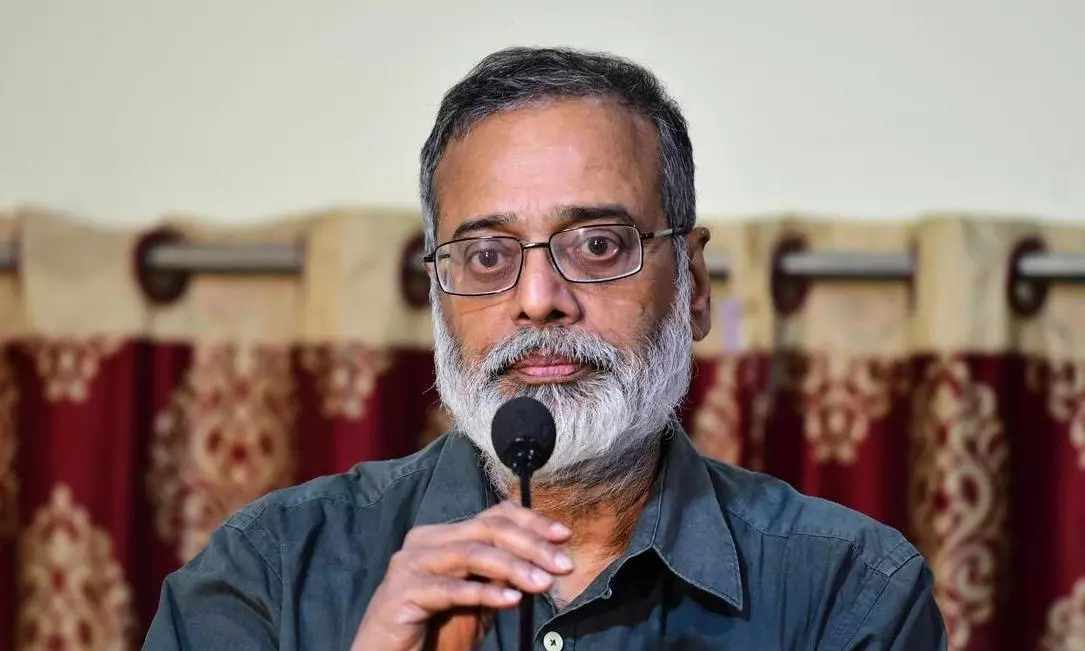
- Home
- India
- World
- Premium
- THE FEDERAL SPECIAL
- Analysis
- States
- Perspective
- Videos
- Sports
- Education
- Entertainment
- Elections
- Features
- Health
- Business
- Series
- In memoriam: Sheikh Mujibur Rahman
- Bishnoi's Men
- NEET TANGLE
- Economy Series
- Earth Day
- Kashmir’s Frozen Turbulence
- India@75
- The legend of Ramjanmabhoomi
- Liberalisation@30
- How to tame a dragon
- Celebrating biodiversity
- Farm Matters
- 50 days of solitude
- Bringing Migrants Home
- Budget 2020
- Jharkhand Votes
- The Federal Investigates
- The Federal Impact
- Vanishing Sand
- Gandhi @ 150
- Andhra Today
- Field report
- Operation Gulmarg
- Pandemic @1 Mn in India
- The Federal Year-End
- The Zero Year
- Science
- Brand studio
- Newsletter
- Elections 2024
- Events
- Home
- IndiaIndia
- World
- Analysis
- StatesStates
- PerspectivePerspective
- VideosVideos
- Sports
- Education
- Entertainment
- ElectionsElections
- Features
- Health
- BusinessBusiness
- Premium
- Loading...
Premium - Events

There's a sharp distinction between grounds of arrest and reasons for arrest; how was Prabir Purkayastha supposed to defend himself if he was not given a written communication of the grounds of arrest?
The arrest of Prabir Purkayastha, the editor of NewsClick, under the Unlawful Activities (Prevention) Act (UAPA) in October of 2023 was perceived by civil society organisations as based on scant evidence of any wrongdoing and nothing other than a state-led persecution of independent media voices.
Purkayastha’s arrest by the Delhi police was brazenly contemptuous of the law, as it was effected through a series of procedural irregularities such as not providing a copy of the FIR on arrest, seizure of all electronic devices without providing a hash value, and not specifying the grounds of arrest.
Grounds of arrest
After seven months of arrest, on May 15, 2024, a Supreme Court Bench comprising justices Sandeep Mehta and Justice Gavai released Purkayastha on bail, stating that the accused was not informed of the grounds of his arrest.
This, in the apex court’s opinion, was not a mere procedural violation but really about the heart of the constitutional protections to life and personal liberty. Citing another precedent, the court pronounced: “The life and liberty of an individual is so sacrosanct that it cannot be allowed to be interfered with except under the authority of law”.
It also held that “any attempt to violate such a fundamental right, guaranteed by Articles 20, 21 and 22 of the Constitution of India would have to be dealt with strictly”.
Reasons for arrest
At the heart of the decision is a distinction between grounds of arrest and reasons for arrest. The reasons for arrest are “purely formal parameters, viz. to prevent the accused person from committing any further offence; for proper investigation of the offence” etc. By contrast, the grounds for arrest are specific to the individual and necessarily must contain “all such details in hand of the investigating officer which necessitated the arrest of the accused”.
It is only when the “grounds of arrest” are “effectively communicated” to the accused person that he has the opportunity of “defending himself against custodial remand” and is able to “seek bail”.
Simply put, how is the accused supposed to even defend himself, if he is not given a written communication of the grounds of arrest? It is only this written document, (not mere oral communication) which is the basis of the accused’s legal challenge to his arrest.
This is thus a key dimension of the right to life and personal liberty in Articles 21 and 22.
Opportunity to challenge arrest
The Supreme Court asserted that irrespective of the extraordinary nature of the law – be it UAPA or PMLA (Prevention of Money Laundering Act) – the provisions have to be interpreted in such a way that they conform to the Constitution.
Thus, arrest under the UAPA and PMLA cannot compromise the right of the accused to effective representation against the arrest. This means that the grounds of arrest have to be communicated to the arrested person before he or she is remanded, thereby providing the accused with an opportunity to challenge the arrest.
The Supreme Court successfully weaved a procedural protection into a wider constitutional right.
This way of thinking of procedure as a key dimension of a constitutional right has a distinguished mention in the landmark dissenting judgment of Justice HR Khanna in ADM Jabalpur v State of Madhya Pradesh. Justice Khanna had held that “the history of personal liberty, we must bear in mind, is largely the history of insistence upon procedure”.
Procedural lapses
However, the question which can always be asked about the recognition of a procedural right is that, if the procedural defect is remedied, would the action then be valid? In this case, can the Special Cell file another FIR against Purkayastha, rectifying the procedural irregularity and thereby removing the grounds on which bail was granted?
The judgment, while hinging its bail order on the procedural point discussed above, is not oblivious to the larger context of an investigative agency misusing its power. The top court, in fact, contextualised the reason for bail within the series of illegalities committed by the Special Cell in effecting Purkayastha’s arrest.
Though the FIR was registered on August 17, 2023, the court noted, it was “not uploaded on the website by the investigating agency”. The FIR was “not provided to the appellant despite an application having been made in this regard on his behalf till after the order of police custody remand was passed by the learned remand judge”. A basic right, regarding the reason for arrest, was withheld till October 5, 2023 though Purkayastha was arrested on October 3.
Presence of advocate
Inspite of the Special Cell knowing the “mobile number of the advocate”, the “appellant was presented before the learned remand judge at his residence sometime before 6:00 am on 4th October, 2023 without Purkayastha’s advocate being notified”.
In his place, another advocate “was kept present”, as the court observed, somewhat sarcastically, “purportedly to provide legal assistance to the appellant as required under Article 22(1) of the Constitution of India.”
This subversion of the Constitutional right to be defended by a “legal practitioner of his choice” under Article 22(1), the court noted, was without “rhyme or reason” as the “accused” had ‘engaged an advocate to defend himself.
'Grounds of detention'
The apex court came down heavily on the actions of the investigating agency, noting that this was “a blatant attempt to circumvent the due process of law; to confine the accused to police custody without informing him the grounds on which he has been arrested; deprive the accused of the opportunity to avail the services of the legal practitioner of his choice so as to oppose the prayer for police custody remand, seek bail and also to mislead the court”.
The court was also scathing on the contention of the investigating agency that the remand order which was sent to the advocate of the accused amounted to “grounds of detention”.
It noted: “The grounds of arrest as conveyed to the advocate are more or less a narration of facts picked up from the FIR which in itself does not indicate any particular incident or event which gave rise to the alleged offences”.
Merits of the case
The Supreme Court also alluded to the scant nature of the evidence against the appellant, noting that though it was contended that “Neville Roy Singham, a foreign national were found to be discussing how to create a map of India without Kashmir and to show Arunachal Pradesh as a disputed area but the fact remains that no such map was prepared or published or was found in possession of the appellant or on his devices till the date of his arrest”.
After noting this, the court stated: “We do not feel persuaded to examine these aspects at this stage because the same would require entering into the merits of the case” and the core issue being examined here is “the illegality of the process whereby the appellant was arrested and remanded to police custody”.
Keeping in mind these stinging observations by the Supreme Court regarding the work of the investigating agency, it would be foolhardy for the latter to file another FIR on the same facts, thinking that the procedural violation can be rectified and Purkayastha can be put behind bars yet again.
(The Federal seeks to present views and opinions from all sides of the spectrum. The information, ideas or opinions in the article are of the author and do not necessarily reflect the views of The Federal.)


